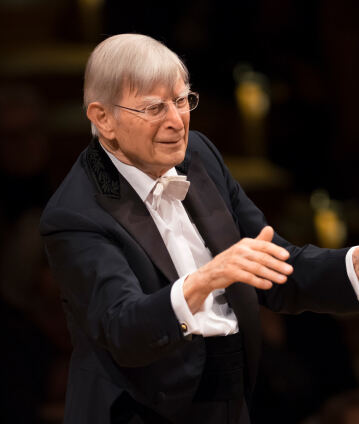Herbert Blomstedt y Yefim Bronfman

Yefim Bronfman es un músico en cuya manera de tocar poderosa y enérgica, así como en su brillante técnica, sigue dejándose sentir la gran tradición pianística rusa del siglo XX. En este concierto interpreta el Segundo Concierto para piano y orquesta de Beethoven. El director es el carismático Herbert Blomstedt, que trae además de su país natal la Segunda Sinfonía de Wilhelm Stenhammar: un descubrimiento posromántico envuelto en fascinantes timbres nórdicos.
In July 2017, Herbert Blomstedt, the doyen of the great conductors, turned 90 and is still active on the international stage – including as a guest of the Berliner Philharmoniker, with whom he enjoys a close musical partnership. The latter also applies to Yefim Bronfman, who last appeared in Philharmoniker concerts performing Beethoven’s Third Piano Concerto. The American pianist now performs the B major Concerto op. 19 which Beethoven himself wrote “into his very fingers”.
Soon after his move from Bonn to Vienna, the composer became one of the foremost piano virtuosos of the time – after all, he produced “difficulties and effects on the piano that we never dreamed of” as his future student Carl Czerny later wrote in his memoirs. Completed only after the C major Concerto op. 15 which he started writing later, the B major Piano Concerto was published in 1801 as opus 19 and provides many of these “difficulties and effects”. However, Beethoven also surprised many contemporaries with his many innovations, such as the pianist, composer and music writer Wenzel Johann Tomaschek, who remarked: “The strange and the original seemed to him to be the main thing in the composition.”
After the interval, the programme continues with the rarely performed Second Symphony by Wilhelm Stenhammar, who studied among other places in Berlin and dedicated his 1896 concert overture Excelsior! to the Berliner Philharmoniker. The Swedish composer and pianist had already presented his Piano Concerto in B minor op. 1 in Philharmoniker concerts under the baton of Richard Strauss on 10 December 1894. In the words of Herbert Blomstedt, there are many good reasons for performing the brilliantly orchestrated Second, whose themes are largely based on old Swedish folk songs and dances and whose conclusion is a captivating fugue finale. In 1915, Stenhammar stated he wanted to write “down-to-earth, honest music without much ado” with this symphony – specifically with less “Richard Strauss and his followers”, but more Bach and Beethoven. “Stenhammar’s Second Symphony,” says Blomstedt, “is undoubtedly his greatest work, but it was not until three years ago that I conducted it for the first time. I have to admit, I have a guilty conscience about it. [...] It should only be natural for me, as a Swedish conductor, working in the world, to perform this music, too. But I never got round to it. When I was 87, I thought: it’s now or never, so I have to do it now!”
© 2019 Berlin Phil Media GmbH
Entrevistas del concierto